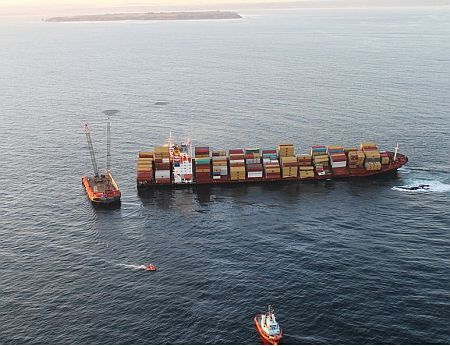
Container recovery operations in the Rena were hampered again with windy conditions persisting in the Bay of Plenty.
Salvage work on the grounded container ship was stalled yesterday due to fierce winds that were forecast to last until Saturday morning.
A team of salvors managed to board the vessel to assess her condition today, confirming she was intact after the stormy night. However, no further containers were removed from the vessel.
A fly-over this morning confirmed a light sheen of oil coming from the vessel, reported to be 150m long and 20m wide.
More dangerous goods identified onboard
Meanwhile, Maritime New Zealand has been advised by the insurers of the Mediterranean Shipping Company, which chartered the vessel, that there are a further 21 containers on the ship carrying potentially hazardous chemicals.
It was originally thought there were only 11 containers which posed a risk to people’s health and the environment but the latest revelation takes the total up to 32.
MNZ director Catherine Taylor said as soon as the Rena grounded on the Astrolabe Reef on October 5 she asked for details about the cargo.
“However, for reasons still unknown, the contents of these 21 containers were not declared as dangerous goods in the original manifest provided to MNZ and as required under the International Maritime Dangerous Goods Code,” she said.
“MNZ is carrying out a thorough investigation as to why these dangerous goods were not declared as required under maritime legislation and whether this constitutes a breach of the law.”
The product is known as cryolite and is described by MNZ as a by-product of the aluminium smelting process, which is considered low risk unless ingested or inhaled directly in its dry powder form.
There are 490 tonnes of the product on board wrapped in one tonne plastic bags inside the containers.
Seventeen of the containers are understood to be underwater and their position under the deck makes them inaccessible to the salvors.
“Expert advice is that the cryolite on board Rena is considered to be of low risk given that the product is only slightly soluble in water, so is expected to dissolve slowly,” Taylor said.
“Any dissolved material will be diluted and dispersed very rapidly, reducing the potential effects further.”
Taylor said finding out about the dangerous material at this stage was frustrating, but justified the careful approach salvors had been taking.
Rare dotterels released
Seventeen rare New Zealand dotterels were released back into the wild yesterday after being pre-emptively caught following the Rena grounding.
The birds were released at three sites along Maramarua beach, east of Pukehina, areas which have now been declared free of oil.
Yesterday’s release was part of the staggered wildlife release programme rolling out over the next few weeks.
Wildlife response manager Nicola McGrouther said the event was kept low-key so the team could monitor how the birds reacted to their reintroduction, and ensure that their processes were effective.
“We are really happy with how the releases went and there will be an opportunity for the public to be involved in a future release,” McGrouther said.
(TVNZ)
We use cookies to improve your experience. By continuing to use our site, you accept our Cookies, Privacy Policy,Terms and Conditions. Close X